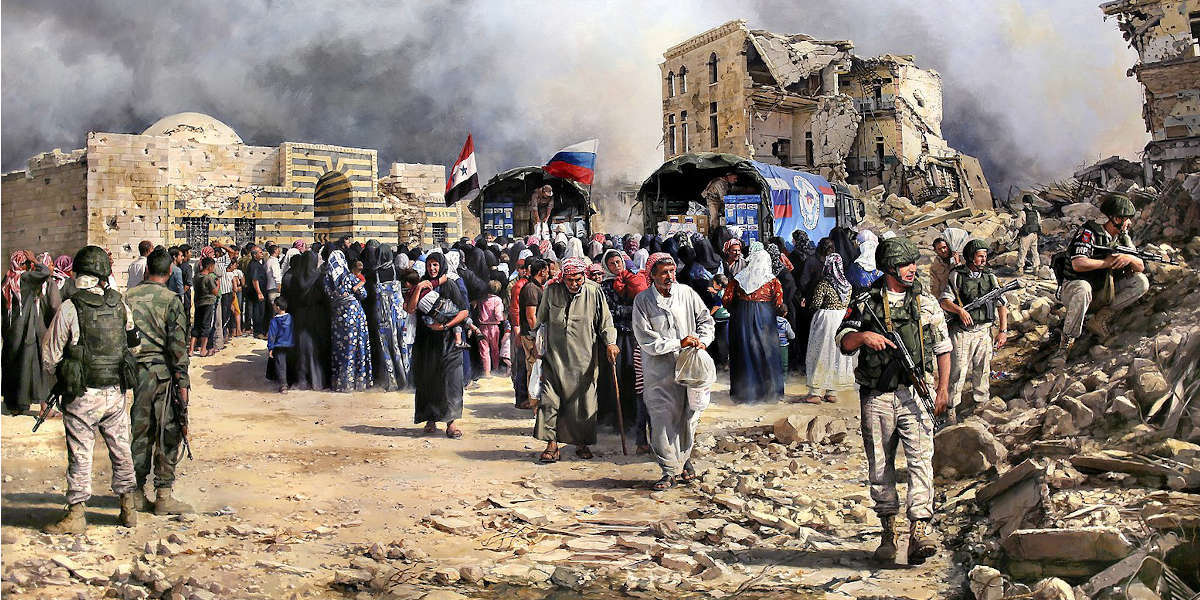In the image
Aleppo: Delivery of supplies to the civilian population, by the Russian troops, after the liberation of the city in 2019 [Augusto Ferrer Dalmau].
Time passes, but memories remain. Eleven years have passed since the young Tunisian, Mohamed Bouazizi, set himself on fire in an act of protest, tracing the beginning of the succeeding fall of the Tunisian authoritarian rule of President Zine El Abidine Ben Ali, and the future removal of the autocratic President Hosni Mubarak in Cairo. Successful events that, due to the rapid spread on social average, motivated the proliferation and unceasing pro-democracy uprisings, known as the Arab Spring, in countries such as Libya, Jordan, Oman, Sudan, and Syria.
Nearly eleven years have passed since March 15, 2011, a key date in which pro-democratic protests were held in several cities around Syria. A decade after, Syrian hope has been brutally condemned, voices heartlessly silenced, thousands of childhoods stolen, and millions of families broken.
It can be said that the authoritarian government of Bashar Al-Assad, currently remaining in power in the country, jointly with the country's sectarian divisions, the weakening of opposition groups on account of the emergence and expansion of the jihadist Islamic State, and the presence of external actors, have become crucial factors in the prolongation of the Syrian conflict.
Since its outburst, the conflict in Syria has been a proxy war, this is, a war in which two or more powers make use of third parties to confront each other and further their interests in the region. Iran, Turkey, Russia, the United States, China, and Saudi Arabia, either search to become a regional power and acquire a leadership role over the country, or hunt for retaining save distance but keeping an eye to any foreign movement over the region gaining influence over a post-Assad order.
For the European Union, Syria is a key factor in regional stability, on account of being a transit country between Europe and the Middle East. Besides, before the conflict, the European Union and Syria had agreements that benefited both.
At present, the Syrian civil war has caused the world's largest refugee crisis of all time. There are 13.4 million people in need of humanitarian aid and protection assistance inside Syria, 6.7 million internally displaced people, and 6.6 million Syrian refugees worldwide, in line with the report of UNHCR, the United Nations Refugee Agency.
The European Union has been the party that has covered most of the humanitarian costs by dealing with a considerable part of the refugee crisis. Since the beginning of the civil war, the European Union has deployed more than 24.9 billion euros, according to the EU Commission. Besides, due to the disproportionate charge faced by Italy, Hungary, and Greece, where most Syrian migrants have arrived, tensions among the European Union member states have been on the rise.
Since its beginning, the Syrian civil war has been a specifically complex crisis when it comes to the protection of fundamental rights. Continuous international humanitarian law violations have been taking place, and lack of protection has been persistently outlined. Hence, struggles among the population to survive and protect their lives have worsened by the Covid-19 pandemic.
It is undeniable that a new reality has been formed through the years: Bashar al-Assad has won the war against the armed anti-regime opposition, Russia has become the main external broker in Syria, and the United States military presence in the region is near to its withdrawal. Thus, the need for the European Union to come up with a new policy of their own is of urgent need.
The European Union has not taken a direct role in ceasefires but has imposed economic sanctions on the Assad government. However, this policy did not really improve the situation of ordinary Syrian people, nor helped to set up an end date to the conflict. What is more, it did the opposite. As Rim Turkmani and Mustafa Haid state in their analysis on 'The role of the EU in the Syrian conflict,' "sanctions worsened the condition of ordinary people and accelerated the development of the predatory war economy."
Russia, which has a military presence, military instructions, and a strong influence in Syria, has different attitudes compared to those of the European Union states with regard to human security and stability to be achieved in the region. Furthermore, what Russia is trying to reach in Syria, is not compatible with the interests held by Europe.
In consequence, Europe can rather ignore Russia's attitude in the territory, leaving the exclusive international responsibility to this former Soviet country, or can engage and thus, participate, in this process of Syrian reconstruction.
The European Union is ready for it, and consequently, its role is to mainly support the Syrian people, treated as defeated enemies through the hall lasting of the conflict, by contributing to the rebuilding of a state and a lost nation. However, this contribution must be provided subject to strict conditions and requirements directed to Assad, as the EU cannot offer him a cost-free re-legitimization, and to the Kremlin. This is, by demanding the preservation and respect of the rule of law, understood by the European Union as a "prerequisite for the protection of all the other fundamental values, including for fundamental rights and democracy," being essential thus "for the proper functioning of the internal market, maintaining an investment-friendly environment and for mutual trust." And, on the other hand, the preservation and defense of civil rights, "including the rights of persons belonging to minorities."
As Volker Perthes states in his article 'Syria: Too fragile to ignore,' the EU must "find a common line on how to reestablish contacts with Damascus," in any case, demanding the protection of the rights of the refugees and the access to the territory of international organizations and NGOs to the most needed people and areas.
The new European Union united strategy must be meticulously studied and applied, as the European Union risks making a huge mistake in Syria.

